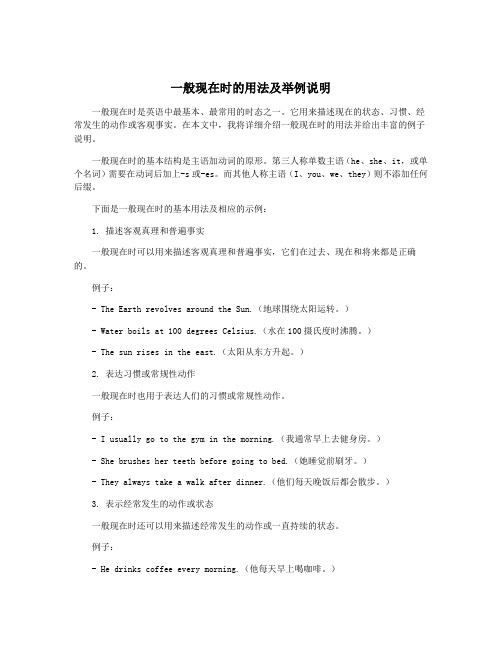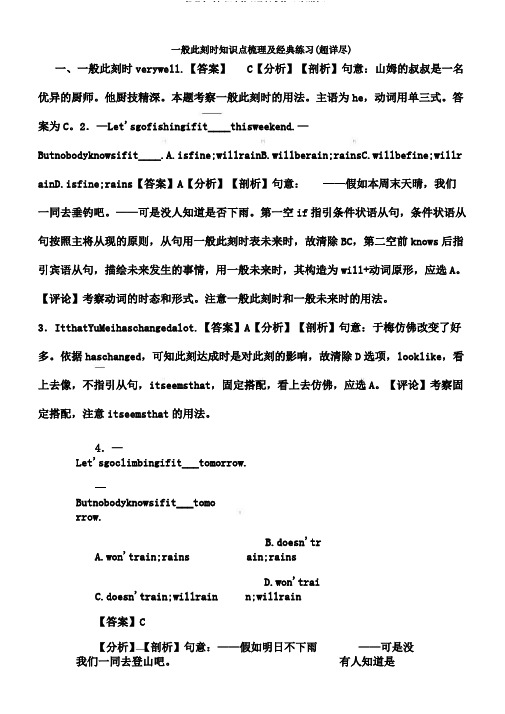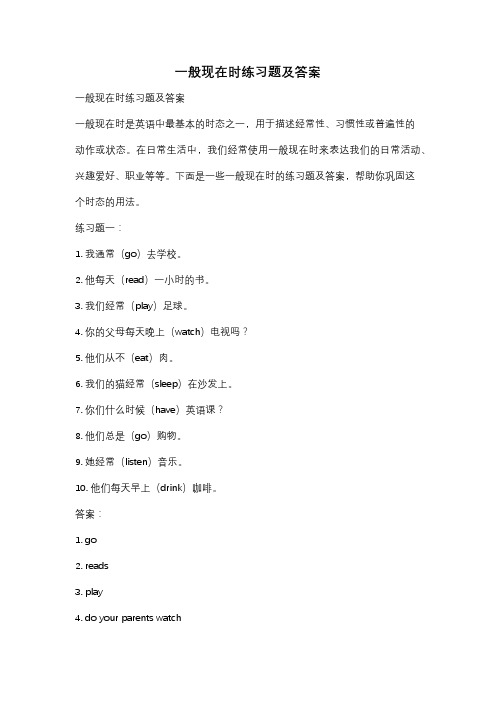一般现在时的基本用法及练习
初中语法重点一般现在时的用法和练习详解

初中语法重点一般现在时的用法和练习详解中学大课堂初中各科学习必备(海量学习资源)关注一般现在时口诀:一般现在时,动词一般用原形。
表达事实,说实话,习惯性动作经常发生。
动词词尾加-s(es),只表单数三人称。
如果换成一般疑问句,那就要看句式了。
系表结构和there be,be放句首可完成;若遇实义动词句,do或does莫忘用。
一、一般现在时概念经常、反复发生的动作或行为及现在的某种状况I always get up at seven o’clock.我早上总是7点钟起床。
He usually visits her grandparents>他通常在周末去看望他的祖父母。
We sometimes eat outside.我们有时在外面吃饭。
You always blink when you tell a lie.你说谎的时候总是眨眼睛。
二、基本结构动词原形(如主语为第三人称单数,动词上要改为第三人称单数形式)We always have seven classes every day.我们每天上七节课。
It seldom snows here.这很少下雪He is always ready to help others.他随时准备帮助其他人。
Action speaks louder than words.行动胜于空谈。
否定形式:am/is/ are+ not;此时态的谓语动词若为行为动词,则在其前加dont,如主语为第三人称单数,则用doesnt,同时还原行为动词He is always ready to help others.变成否定句:He isn’t always ready to help others.We always have seven classes every day.变成否定句:We don’t always have seven classes every day.He usually visits his grandparents>变成否定句:He doesn’t usually visit his grandparents>一般疑问句:把be动词放于句首;用助动词do提问,如主语为第三人称单数,则用does,同时,还原行为动词。
一般现在时用法及专项练习

一般现在时(the simple present tense)一、定义是一种英语语法形式,表示规律性、通常性、习惯性、真理性的动作或状态。
二、结构(一)肯定句1. 主语 + be 动词(am/is/are)+ 其他。
例如:I am a student.(我是一名学生。
)2. 主语 + 动词原形。
例如:We play basketball on weekends.(我们在周末打篮球。
)3.主语(第三人称单数)+动词第三人称单数形式。
一般在动词词尾加 -s 或 -es。
例如:He plays football after school.(他放学后踢足球。
)Tom usually goes to school at 7:30.(汤姆通常7点半去学校。
)(二)否定句1. 主语 + be 动词(am/is/are)not +其他。
例如:I am not a student.(我不是一名学生。
)2. 主语 + do not(don’t) +动词原形。
例如:We do not play basketball on weekends.(我们周末不打篮球。
)3.主语(第三人称单数)does not(doesn’t )+动词原形。
例如:He does not play football after school.(他放学后不踢足球。
)(三)一般疑问句1. Be动词+主语+其他?例如:Is she a student?(她是学生吗?)2. Do/Does + 主语 + 动词原形?例如:Do you play football after school? (你放学后踢足球吗?)Does he work here? (他在这里工作吗?)三、用法1. 描述习惯或重复动作:常与表示频率的时间状语连用。
例如:I get up at 6 o'clock every morning. (我每天早上六点起床。
)He goes to school by bus. (他乘公共汽车上学。
一般现在时的用法及举例说明

一般现在时的用法及举例说明一般现在时是英语中最基本、最常用的时态之一。
它用来描述现在的状态、习惯、经常发生的动作或客观事实。
在本文中,我将详细介绍一般现在时的用法并给出丰富的例子说明。
一般现在时的基本结构是主语加动词的原形。
第三人称单数主语(he、she、it,或单个名词)需要在动词后加上-s或-es。
而其他人称主语(I、you、we、they)则不添加任何后缀。
下面是一般现在时的基本用法及相应的示例:1. 描述客观真理和普遍事实一般现在时可以用来描述客观真理和普遍事实,它们在过去、现在和将来都是正确的。
例子:- The Earth revolves around the Sun.(地球围绕太阳运转。
)- Water boils at 100 degrees Celsius.(水在100摄氏度时沸腾。
)- The sun rises in the east.(太阳从东方升起。
)2. 表达习惯或常规性动作一般现在时也用于表达人们的习惯或常规性动作。
例子:- I usually go to the gym in the morning.(我通常早上去健身房。
)- She brushes her teeth before going to bed.(她睡觉前刷牙。
)- They always take a walk after dinner.(他们每天晚饭后都会散步。
)3. 表示经常发生的动作或状态一般现在时还可以用来描述经常发生的动作或一直持续的状态。
例子:- He drinks coffee every morning.(他每天早上喝咖啡。
)- They play tennis every weekend.(他们每个周末打网球。
)- The cat sits on the windowsill.(猫坐在窗台上。
)4. 表达现在时刻正在发生的动作一般现在时也可以用来描述现在时刻正在发生的动作。
例子:- I am writing an essay right now.(我现在正在写一篇文章。
一般现在时的用法_练习强化

一般现在时的用法_练习强化英语一般现在时常表达现在的状态、习惯以及现在时刻的瞬时动作,而它的使用方法你掌握了多少呢?以下是由店铺整理关于一般现在时的用法的内容,希望大家喜欢!一般现在时的用法一、一般现在时态的用法1、经常、反复发生或习惯性的动作。
We have three meals every day.2、现在或经常存在的状态。
I am usually at home at this time of day.3、主语具备的性格、能力和本质等.She likes watching TV.4、客观事实、普遍真理、名言、警句或谚语等.The earth goes around the sun.5、按时间表拟定或已安排要发生的动作或事情。
动词arrive, begin, come等.The plane leaves Nanchang at 3:00 pm.6、由when,before,after等连接的时间从句/由if引导的条件从句,用一般现在时表将来。
Come and meet us at the station if you have time this afternoon.7、由here或there引导的倒装句中表此刻正在发生的动作,用一般现在时替代现在进行时。
There goes the bell.8、用于文章标题、剧情介绍、图片说明、电台评论等情况。
Have you ever read the book Everything Is Ready?二、一般现在时态谓语部分的构成1、be动词(am is are)肯定式:am/is/are + 表语. He is a teacher.否定式:am/is/are + not + 表语. He is not a teacher.疑问式:将am/ is/ are提到句首. Is he a teacher?2、情态动词型:肯定式:情态动词 + 动词原形。
T om can speak Chinese.否定式:情态动词+ not + 动词原形。
一般现在时知识点梳理及经典练习(超详细)

一般此刻时知识点梳理及经典练习(超详尽)一、一般此刻时verywell.【答案】C【分析】【剖析】句意:山姆的叔叔是一名优异的厨师。
他厨技精深。
本题考察一般此刻时的用法。
主语为he,动词用单三式。
答案为C。
2.—Let'sgofishingifit____thisweekend.—Butnobodyknowsifit____.A.isfine;willrainB.willberain;rainsC.willbefine;willr ainD.isfine;rains【答案】A【分析】【剖析】句意:——假如本周末天晴,我们一同去垂钓吧。
——可是没人知道是否下雨。
第一空if指引条件状语从句,条件状语从句按照主将从现的原则,从句用一般此刻时表未来时,故清除BC,第二空前knows后指引宾语从句,描绘未来发生的事情,用一般未来时,其构造为will+动词原形,应选A。
【评论】考察动词的时态和形式。
注意一般此刻时和一般未来时的用法。
3.ItthatYuMeihaschangedalot.【答案】A【分析】【剖析】句意:于梅仿佛改变了好多。
依据haschanged,可知此刻达成时是对此刻的影响,故清除D选项,looklike,看上去像,不指引从句,itseemsthat,固定搭配,看上去仿佛,应选A。
【评论】考察固定搭配,注意itseemsthat的用法。
4.—Let'sgoclimbingifit___tomorrow.—Butnobodyknowsifit___tomorrow.A.won'train;rainsB.doesn'tr ain;rainsC.doesn'train;willrainD.won'trai n;willrain【答案】C【分析】【剖析】句意:——假如明日不下雨我们一同去登山吧。
——可是没有人知道是否明日会不会下雨。
if指引的条件状语从句,按照主将从现的原则,第一空,if 指引条件状语从句,从句用一般此刻时,第一空填doesn'train,第二空if,能否,指引宾语从句,依据tomorrow,可知宾语从句用一般未来时,第二空填willrain,应选C。
一般现在时练习题及答案

一般现在时练习题及答案一般现在时练习题及答案一般现在时是英语中最基本的时态之一,用于描述经常性、习惯性或普遍性的动作或状态。
在日常生活中,我们经常使用一般现在时来表达我们的日常活动、兴趣爱好、职业等等。
下面是一些一般现在时的练习题及答案,帮助你巩固这个时态的用法。
练习题一:1. 我通常(go)去学校。
2. 他每天(read)一小时的书。
3. 我们经常(play)足球。
4. 你的父母每天晚上(watch)电视吗?5. 他们从不(eat)肉。
6. 我们的猫经常(sleep)在沙发上。
7. 你们什么时候(have)英语课?8. 他们总是(go)购物。
9. 她经常(listen)音乐。
10. 他们每天早上(drink)咖啡。
答案:1. go2. reads3. play4. do your parents watch5. eat6. sleeps7. do you have8. go9. listens to10. do they drink练习题二:1. 你通常几点起床?2. 他们每周末去哪里?3. 你的朋友们喜欢什么运动?4. 你们的狗喜欢吃什么食物?5. 他们多久去一次健身房?6. 你们的邻居是干什么的?7. 你每天晚上做什么?8. 他们有多少个孩子?9. 你喜欢什么颜色?10. 他们通常什么时候吃晚饭?答案:1. What time do you usually get up?2. Where do they go on weekends?3. What sports do your friends like?4. What food does your dog like?5. How often do they go to the gym?6. What do your neighbors do?7. What do you do every evening?8. How many children do they have?9. What color do you like?10. When do they usually have dinner? 练习题三:1. 我们经常(go)购物。
一般现在时知识点梳理及经典练习(超详细)
一般现在时知识点梳理及经典练习(超详细)一、初中英语一般现在时1.—This bed is too big for Jack's bedroom.—Yes.it too much space.A. looks forB. depends onC. takes upD. throws away【答案】C【解析】【分析】句意:这个床对于杰克的房间来说太大了。
这个床占据了太多空间。
takes up占据。
故C选项正确。
【点评】考查动词短语的辨析。
2.The children will climb the mountain if it________ tomorrow.A. won't rainB. didn't rainC. isn't rainingD. doesn't rain【答案】 D【解析】【分析】句意:如果明天不下雨,孩子们会去爬山。
if 引导的条件状语从句遵循主将从现的原则,主句用一般将来时,从句用一般现在时,从句是一个否定句,含有实义动词rain的否定句,要借助助动词don't/doesn't构成,主语是it,助动词用doesn't,故选D。
【点评】考查if引导的条件状语的时态。
注意句子涉及到if引导的条件状语从句的用法。
3.—Let's go fishing if it ____ this weekend.—But nobody knows if it ____.A. is fine; will rainB. will be rain; rainsC. will be fine; will rainD. is fine; rains 【答案】 A【解析】【分析】句意:——如果本周末天晴,我们一起去钓鱼吧。
——但是没人知道是否下雨。
第一空if引导条件状语从句,条件状语从句遵循主将从现的原则,从句用一般现在时表将来时,故排除BC,第二空前knows后引导宾语从句,描述将来发生的事情,用一般将来时,其结构为will+动词原形,故选A。
一般现在时结构及练习
一般现在时结构及专项练习概念:1. 表示现在的状态I am twelve。
2。
表示经常或习惯性动作He gets up at six。
3。
表示客观事实真理The earth goes around the sun。
标志性词语:often,usually,sometimes,always,never,on Sunday,every year/month/dayShe often goes to school on foot.He goes to park once a week。
行为动词第三人称单数加—s 的形式1。
一般动词直接加-s 2。
以辅音字母+y,把y 改i 再加es,3. 以s,x,sh,ch 结尾的动词加-es 4。
以o 结尾的动词一般加—es5. 特殊情况:have—has基本结构Be 型:肯定式:主语+ am/is/are +其他否定式:主语+ am/is/are+not+其他一般疑问句:Am/Is/Are+主语+其他?特殊疑问句:特殊疑问词is/are+主语?实义动词型:肯定式:主语+行为动词(注意人称三单形式)+其他否定式:主语+don't/doesn’t+动词原形+其他一般疑问句:Do/Does+主语+动词原形+其他?特殊疑问句:特殊疑问词+do/does+主语+动词原形?1写出下列动词的第三人称形式wash: watch:study:finish:go:snow:carry:stop:see:drive:let:teach:keep:join:put:do:drink:enjoy play:begin:take:run: fly:talk:stay:look:think:carry: fix:单项选择1。
There _____ an English film at the cinema now.A:is B:are C:am D:be2. The picture nic e. A:look B:looks C:looked D:be look3. He sits down and soon asleep.A:fall B:falling C:falled D:falls4。
必备英语一般现在时技巧全解及练习题(含答案)
必备英语一般现在时技巧全解及练习题(含答案)一、初中英语一般现在时1.We will go to Tian'anmen Square to watch the raising of the national flag if it tomorrow.A. will rainB. rainsC. doesn't rainD. won't rain 【答案】 C【解析】【分析】主句用一般将来时.if引导的条件状语从句用一般现在时态,即“主将从现”,故选C。
句意是:如果明天不下雨我们将去天安门广场看升旗。
【点评】本题考查if 引导的条件状语从句,主句用将来时,从句用一般现在时。
2.My father is a tea lover. He __________ tea every day.A. drinkB. drinksC. drankD. will drink【答案】 B【解析】【分析】句意:我爸爸是一个茶痴,他每天都喝茶。
every day表明时态是一般现在时,主语是he,所以drink用drinks,C是一般过去时;D是一般将来时,故选B。
【点评】考查一般现在时,注意平时识记其标志词及动词的单三式。
3.I don't know if he tomorrow. If he , I'll call you at once.A. comes, comesB. will come; comesC. will come, will come【答案】 B【解析】【分析】句意:我不知道他明天是否回来。
如果他来,我会马上打电话给你。
第一个空,根据tomorrow,可知宾语从句是时态是一般将来时,第二个空是if 引导的条件状语从句,时态是主将从现,故此处是一般现在时,故选B。
【点评】考查宾语从句,注意一般将来时的用法。
4.Our Geography teacher told us that the Earth ____________ the sun.A. went aroundB. goes aroundC. is going aroundD. was going around【答案】 B【解析】【分析】句意:我们的地理老师告诉我们地球绕着太阳转。
一般现在时的用法及练习题(带答案)
一般现在时的用法及练习题定义:一般现在时表示现在经常反复发生的动作、存在的状态或习惯性的动作的时态。
构成:一般现在时用行为动词的原形,但第三人称单数作主语时,动词的词尾要加-S。
(一般的动词词尾+S。
以sh/ch/s/x结尾的词+es.以辅音字母Y结尾的把Y变成i,+es。
辅音字母+o结尾的+es.)形式:主语+动词原形+宾语用法:1.表示经常的或习惯性的动作,常与表示频度的时间状语连用。
2.表示主语具备的性格、能力和特征。
3.表示现在的状态。
4.表示客观事实和普遍真理。
5.在时间状语从句和条件状语从句中,常用一般现在时代替将来时。
6.表示预先计划或安排好的行为。
7.小说故事用一般现在时代替一般过去时。
8.有些表示状态和感觉的动词表示现在发生的具体行为时,只用一般现在时,而不用进行时态。
9.表示现在发生的具体动作或存在的状态一般现在时的用法:1) 经常性或习惯性的动作,常与表示频度的时间状语连用。
时间状语:always,usually,regularly,every morning/night/evening/day/week,often, sometimes, occasionally,from time to time, twice a week, rarely, seldom, once a month hardly ever, never.I leave home for school at 7 every morning.2) 客观真理,客观存在,科学事实。
The earth moves around the sun.Shanghai lies in the east of China.3) 表示格言或警句中。
Pride goes before a fall. 骄者必败。
☆注意★:此用法如果出现在宾语从句中,即使主句是过去时,从句谓语也要用一般现在时。
例:Columbus proved that the earth is round..4) 现在时刻的状态、能力、性格、个性。
- 1、下载文档前请自行甄别文档内容的完整性,平台不提供额外的编辑、内容补充、找答案等附加服务。
- 2、"仅部分预览"的文档,不可在线预览部分如存在完整性等问题,可反馈申请退款(可完整预览的文档不适用该条件!)。
- 3、如文档侵犯您的权益,请联系客服反馈,我们会尽快为您处理(人工客服工作时间:9:00-18:30)。
一般现在时的用法一般现在时表示人、事、物现在的状况和特点或表示经常性、习惯性的动作,句中常有always、often、usually等时间状语。
现在时还可用于表达格言、科学事实、客观真理和至今不变的客观事实。
注意:主语是任何一个单数名词或者是第三人称单数,谓语动词要进行必要的变化。
特别提一点:不可数名词也算作单数处理。
动词第三人称单数的变化规则及发音规律动词原形变第三人称单数的规则与发音规律同名词单数变复数大致相同,请认真观察。
1、大多数动词在词尾加“S”,在清辅音后发音为[s],在浊辅音及元音后发音为[z]。
如:stop-stops[s]make-makes[s]read-reads[z]play-plays[z]2、以辅音字母加“y”结尾的,要先将“y”变为“i”,然后在加“es”读[iz]如:fly-flies[z];carry-carries[z]study-studies[z];worry-worries 3、以“s,x,ch,sh”结尾的,在词尾加“e s”,发音为[iz]如:teach-teaches[iz];watch-watches[iz]4、以“o”结尾的动词,加“es”,读[z]如:go-goes[z]do-does[z]句型I.疑问1.对于谓语动词或助动词是 be、have、can/may/must 等,将这些词移到主语前面。
Are you students?Yes, we are. / No, we aren't.你们是一名学生吗?是的。
我们是一名学生。
/不,我们不是。
Is Jane in the classroom? Yes, she is. / No, she isn't.简在这个教室里面吗?是的,她在。
/不,她不在。
Does the house have two rooms? Yes, it does / No, it doesn't.这栋房子里面有两个房间吗?是的/不,不是。
Is there any water in the glass? Yes, there is. / No, there isn't.杯子里面有水吗?是的,有。
/不,没有。
Can you swim? Yes, I can. / No, I can't.你会游泳吗?是的,我会。
/不,我不会。
2.谓语动词是实义动词,方法是在主语前加助动词do或does构成,句中动词要改用原型动词。
do用于第一人称和名词复数,does用于第三人称单数和名词单数或不可数名词。
Do you know it?Yes, I do. / No, I don't.你知道这个吗?是的,我知道/不,我不知道。
Does she have a pen?Yes, she does. / No, she doesn't.[have 这里是实义动词]她有一个钢笔吗?Do they play basketball after school? Yes, they do. / No, they don't.他们放学后打篮球吗?II. 否定1. 对于谓语动词或助动词是 be、have、can/may/must 等,后面直接加not。
I am not at college.我不在上大学。
Mr. Wang isn't 50 years old.王先生不是50岁。
The Jacksons have not two sons.贾克森没有两个儿子。
You may not go now.你现在不可能去了。
2.谓语动词是实义动词,是在谓语动词前加do not 或does not,谓语动词改用动词原型。
I don't have lunch at home.我在家没有吃午餐。
They don't play basketball on the sportsground.他们不在运动场上打篮球。
Mr.Jimmy doesn't know French.吉米先生不会法语。
一般现在时用来表示经常的或习惯性的动作,常与以下的时间状语连用:often 经常,always 总是,sometimes 有时,usually 通常,every day/ week 每天/ 周等。
He/She usually goes to school by bike. 通常他/她骑车上学。
I visit my grandparents every week. 我每个星期都去看祖父母。
He/She is always late for class. 他/她总是上课迟到。
My parents and I sometimes go out to eat. 我和父母有时出去吃饭。
It often rains here. 这儿常常下雨。
一般现在时用法专练(A)Ⅰ.用括号内动词的适当形式填空。
1. He often (have) dinner at home.2. Daniel and Tommy (be) members of the Reading Club.3. She and I (take)a walk together every evening.4. There (be) some water in the bottle.5. We (not watch) TV on weekdays.6. Nick (not do) his homework on Sundays.7. they (like) the World Cup?8. What they usually (do) on holidays?9. your parents (read) newspapers every day?10. The girl (teach) us English on Sundays.Ⅱ.按照要求改写句子。
1. Daniel watches TV every evening. (改为否定句)Daniel TV every evening.2. I do my homework every day. (改为一般疑问句并作否定回答)—— you homework every day?——No, I .3. She likes milk.(改为一般疑问句并作肯定回答)—— she milk?—— Yes, she .4. Simon is from Beijing. (同义句改写)Simon Beijing.5. Millie is clever at math. (同义句改写)Millie math.Ⅲ.改错。
1. Is you brother speak English?A B C ( )2. Does he looks like his father?A B C ( )3. He likes play games after class.A B C ( )4. Mr. Wu teachs us English.A B C ( ) 5….She doesn’t her homework on Sundays.A B C ( ) Ⅳ.将下列句子译成英文。
1._桑迪放学后打羽毛球吗?不.她学习很用功.放学后她总是看书.._ Sandy badminton after school?No. She hard. She always books after school.2.他在第三中学上学.他每天早上七点上学.He in No .3 Middle School. He to school at 7a.m.every day .3.父亲早晨送我到学校.My father me to school in the morning.4.我女儿喜欢看电视和听音乐..My daughter TV and to music.5.西蒙朋友的姐姐长大后想当一位歌手.Simon’s friend’s sister to a singer when she up.(B)1.按要求改写下列句子.1、Sandy has long hair in a ponytail. (改为一般疑问句并作肯定回答)Sandy long hair in a ponytail?Yes, .2、Simon and Daniel are good friends .(改为否定句)Simon and Daniel ______ good friends.3、We are in the school football team. (改为一般疑问句并作肯定回答)you in the school football team? Yes, ..4、Amy likes playing computer games. (改为一般疑问句并作否定回答)________ Amy ________ playing computer games? No, ________ ________.5、We go to school every morning . (改为否定句)We ________ ________ to school every morning.6、She is always ready to help others. (改为一般疑问句并作否定回答)________ she always ready to help others? No, ________ ________.7、The earth goes around the sun. (改为一般疑问句并作肯定回答)________ the earth ________ around the sun? Yes, ________ ________.8、He speaks English very well. (改为否定句)He ________ speak English well.9、John comes from Canada.(对划线部分提问)Where ________John ________ from?10、I like taking my dog for a walk after supper.What ________ you ________ ________ after supper?.二. 改错1. Lily and Lucy doesn’t want to clean the blackboard.2. Mr. Green likes work in China very much.3. My mother often go to the shop on Sundays.4. She doesn’t likes bread or cakes.5. Where is Jim and Kate now?6. There are some water and leaves in the pool.7. Please give a color pencil for me.8. They aren’t go to school at the weekend.9. The dog sits between the chair.10. She often works hard and goes to bed in night.11. Millie is good in English. She speaks English well.12. She is a member at the Computer Club.13. Do you help your mother in the housework?14. Do Simon often go home by a bus? .15. I often take bus to school.16. Do you want to play with us after the school?17. Daniel and David want to play on us.18. There is a lots of water in the bottle.19. Wendy has much friends in class.20. There are so lots of people in the hall.(C)一用所给动词正确形式填空1. He loves ______________ (read) newspaper.2. Nick goes ______________ (swim) every Saturday afternoon.3. Simon enjoys______________ (play) football.4. Mr. Mu likes ______________ (walk) after school.5. Amy likes ______________ (talk) on the phone with her friends.6. Simon usually goes ______________ (run) for half an hour.7. Sandy enjoys ______________ (look) for things on the Internet.8. I don’t like ______________ (dance).9. Eric is a member of the ______________ (read) Club.10. It’s a fine day. What about ______________ (play) badminton in the park?二用适当的介词填空1. I go to school _________ my friends.2. Daniel is clever _______English.3. Millie takes Eddie _________a walk every afternoon..4. Kitty lives _________a flat _________Beijing.5. Sandy sits _________Kitty and Amy.6. Here is a picture _________my family. Do you want to look _________it?7. Does Simon often eat _________a restaurant?8. _________ the weekend, Wendy and Kitty play tennis _________an hour.9. Sandy has black hair _________ a ponytail. Kitty has long black hair _________ bunches.10. Mr. Smith comes _________ New York. He is American.(D)1.We often___________(play) on the playground.2.He _________ (get) up at six o’clock.3.__________you _________ (brush) your teeth every morning.4. What(do) he usually (do) after school?5.Danny (study) English, Chinese, Math, Science and Art at school.6.Mike sometimes __________ (go) to the park with his sister.7.At eight at night, she ________ (watch) TV with his parents.8.________ Mike________ (read) English every day?9.How many lessons ______your classmate____ (have) on Monday?10.What time ____his mother_________ (do) the housework?改句子1.Do you often play football after school? (肯定回答)2.I have many books.(改为否定句)3.Gao Shan’s sister likes playing table tennis (改为否定句)4.She lives in a small town near New York.(改为一般疑问句)5.I watch TV every day. (改为一般疑问句)6.David has a goal. (改为一般疑问句)7.We have four lessons.(否定句)8.Nancy doesn’t run fast (肯定句)9.My dog runs fast.否定句:一般疑问句:10.Mike has two letters for him.一般疑问句:否定句:11. I usually play football on Friday afternoon.否定句:一般疑问句:划线提问12.Su Yang usually washes some clothes on Saturday.否定句:一般疑问句:划线提问:13.Mingming usually waters the flowers every day否定句:一般疑问句:划线提问14.Tom does his homework at home.否定句:一般疑问句:划线提问(E)I.写出下列动词的第三人称单数形式:1. wash _________ match _______guess______ study______ finish_________ go________ snow______ carry_________2. stop ______ see________ drive ________let_______ carry______ keep_____ join______find_______ think________ teach______ catch______3. stay _______ begin______ forget_______ forget ______ lie________ die _______ run_______ prefer______ give________ ring_______ dance______ hope_______II. 用所给动词的适当形式填空:1.I ________(write) to you as soon as I _______(get) to London.2. He doesn’t feel well and ____________ (not eat) any food this morning.3. He ______ not _______ (see) me come in, for he ___________ (read) something with great interest.4. I _________ (let) you have the book as soon as I _________(finish) it.5. While we waiting (wait) for our teacher, a little boy ________(run) up to us.6. Don’t make a noise. Grandpa __________(sleep).Welcome !!! 欢迎您的下载,资料仅供参考!。
